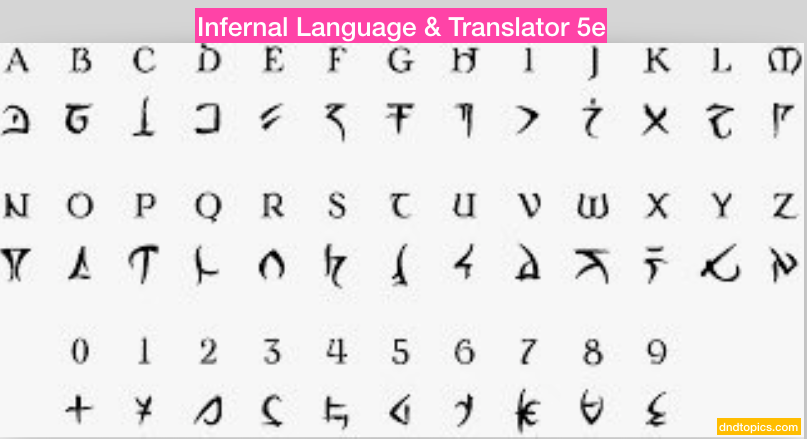In the sprawling tapestry of Dungeons & Dragons lore, where ancient evils clash with valiant heroes and the very fabric of reality can be bent by will and word, languages serve as more than just a means of communication. They are conduits of power, reflections of culture, and whispers of forgotten histories. Among the myriad tongues that echo across the multiverse, few are as chillingly potent and meticulously crafted as Infernal. The language of the Nine Hells, Infernal is not merely a collection of sounds and symbols; it is an embodiment of law, malice, and absolute dominion, etched into the very souls of those who speak it.
This article delves deep into the infernal abyss, exploring the sonic landscape, the intricate script, the speakers, the magical properties, and the profound impact Infernal has on D&D campaigns. From the guttural growls of a Pit Fiend to the precise calligraphy of a devil’s contract, Infernal is a testament to the structured evil that defines the denizens of Baator.
The Sound and Fury: Phonetics and Pronunciation
To hear Infernal is often to experience a cacophony designed to instill dread, submission, or outright pain in non-devils. Unlike the primal, chaotic shrieks and roars of Abyssal, Infernal is characterized by a precise, almost surgical harshness. Its phonetics are often described as:
- Guttural and Sibilant: It is a language heavy with sounds produced deep in the throat, often accompanied by hissing "s" and "sh" sounds, reminiscent of serpents. This combination creates a sense of predatory menace, like a beast coiling before it strikes.
- Booming and Resonant: When spoken by powerful devils, Infernal can vibrate with an oppressive weight, resonating with a deep, chest-rattling quality that demands attention and obedience. Imagine the voice of an Archdevil, each syllable a pronouncement of inescapable doom.
- Sharp and Angular: Words often end abruptly, with hard consonants and clipped vowels that deny any sense of softness or comfort. There is no poetic flow or melodic cadence in Infernal; it is utilitarian in its malice.
- Painful to Non-Devils: Mortals who hear Infernal spoken in its true, unmitigated form often report feelings of discomfort, nausea, or even physical pain. The very vibrations of the language can assault the senses, particularly when spoken with magical intent or by a powerful entity. It is a language not meant for mortal ears, a testament to the alien nature of the Nine Hells.
A typical Infernal phrase might combine deep, resonant ‘gh’ or ‘kr’ sounds with sharp ‘t’ or ‘z’ sounds, ending with a drawn-out, hissing vowel. For Dungeon Masters, simulating Infernal can involve using a deeper voice, emphasizing harsh consonants, and speaking with a deliberate, almost ritualistic rhythm. It’s less about speed and more about impact, each word a hammer blow.
The Script of Damnation: Infernal Runes
Beyond its auditory terror, Infernal possesses a distinct written form: a script known for its intricate, angular, and often menacing appearance. This script is as precise and unforgiving as the laws of the Nine Hells themselves.
- Angular and Geometric: Infernal runes are characterized by sharp angles, straight lines, and often symmetrical patterns. There is a rigid adherence to form, reflecting the lawful nature of devils and their obsession with order, albeit a twisted, evil order.
- Intricate and Detailed: While angular, the script is far from simple. Complex characters and ligatures (combinations of letters) are common, requiring a steady hand and keen eye to transcribe accurately. This intricacy often signifies the depth of meaning packed into seemingly simple words or phrases.
- Aesthetic of Power: The script is designed to be visually imposing. Inscriptions in Infernal often adorn devilish architecture, weapons, and magical artifacts, serving as a constant reminder of the devils’ power and their dominion. Seeing Infernal script is meant to evoke a sense of ancient, unyielding evil.
- Magical Significance: Each rune, each line, holds inherent magical power. When carved into a contract, a summoning circle, or a cursed object, the Infernal script is not merely descriptive; it is prescriptive. It binds, it commands, it curses. Deciphering Infernal texts often requires not just linguistic skill but also an understanding of arcane principles, as the language itself is interwoven with infernal magic.
For players, encountering Infernal script might involve a challenging Intelligence (Investigation) or Wisdom (Perception) check to even recognize it, followed by an Intelligence (Arcana) or Intelligence (History) check for those proficient in the language to decipher its meaning. Misinterpretations can lead to dire consequences, especially when dealing with infernal contracts.
Speakers and Scholars: Who Utters Infernal?
Infernal is the lingua franca of the Nine Hells, and as such, its primary speakers are the devils themselves, from the lowliest Imp to the mightiest Archdevil.
- Devils: All devils, by their very nature, are fluent in Infernal. It is their native tongue, the language in which they scheme, command, and formalize their infernal bargains. High-ranking devils speak with an authority and precision that can be mesmerizingly terrifying.
- Cultists and Warlocks: Mortals who enter into pacts with fiends, particularly those who pledge allegiance to Archdevils, often learn Infernal. Warlocks with the Fiend patron, in particular, might find themselves drawn to or even gifted with the ability to speak and understand Infernal, as it is the language of their otherworldly benefactor.
- Evil Mages and Scholars: Sorcerers, wizards, and other arcane practitioners who delve into forbidden knowledge, summon fiends, or study infernal lore often dedicate themselves to learning Infernal. For them, it is a tool for power, a means to understand and control the forces they seek to wield.
- Damned Souls: Some souls unfortunate enough to end up in the Nine Hells might, over eons of torment, begin to comprehend and even speak fragments of Infernal, though it is usually a twisted, broken version of the true language.
- Unique Creatures: Certain fiendish creatures or those corrupted by infernal energies might also speak or understand Infernal, having been born or transformed under its influence.
Proficiency in Infernal for a player character is a significant choice, indicating a backstory steeped in fiendish encounters, forbidden studies, or a pact with an infernal power. It opens doors to certain interactions but also marks the character in ways that can draw unwanted attention from celestial or lawful good forces.
The Language of Law and Lies: Infernal’s Purpose
Infernal is far more than just a means of basic communication. It is a language built for specific, sinister purposes, reflecting the lawful evil alignment of its primary speakers.
- Infernal Contracts: This is perhaps the most iconic use of Infernal. Every word in an Infernal contract is chosen with surgical precision, designed to ensnare the signatory in legalistic traps and loopholes that benefit the devil. These contracts are magically binding, and the language itself helps enforce their terms. Understanding the nuances of Infernal is crucial to avoiding eternal damnation when dealing with devils.
- Command and Control: Infernal is a language of absolute authority. Devils use it to issue commands to their inferiors, to direct their legions, and to enforce the strict hierarchy of the Hells. When spoken with true intent, Infernal commands are almost impossible for lesser devils to disobey without dire consequences.
- Summoning and Binding: The precise words and phrases of Infernal are essential for summoning rituals, binding spells, and controlling summoned fiends. A single mispronunciation can have catastrophic results, releasing a powerful devil from control or twisting the spell’s intent.
- Propaganda and Subjugation: Within the Nine Hells, Infernal is used to propagate the devils’ ideology, to instill fear, and to maintain the rigid social structure. It is the language of decrees, proclamations, and the endless litanies of damnation.
- Knowledge and Lore: Vast libraries of infernal knowledge are inscribed in Infernal script. These texts contain ancient secrets, forbidden spells, historical accounts of the Blood War, and philosophical treatises on the nature of evil and order.
The lawful evil nature of Infernal means that while devils are masters of deception, they rarely outright lie when speaking Infernal in a formal context. Instead, they twist truths, exploit ambiguities, and rely on the precise wording to achieve their goals, always within the confines of their strict, albeit malevolent, laws.
Infernal as a Magical Conduit
The very essence of Infernal is imbued with magic. It is a language of power, capable of directly influencing reality when wielded by those who understand its true nature.
- Words of Power: Many spells, particularly those dealing with conjuration, enchantment, and necromancy, might incorporate Infernal phrases or incantations. These words are not just flavor; they are the keys to unlocking magical effects, channeling infernal energy, or drawing upon the dark powers of the Lower Planes.
- True Names: Perhaps the most potent magical aspect of Infernal is its connection to True Names. Every devil has a True Name, known only in Infernal. To know a devil’s True Name is to gain immense power over it, allowing a mortal to bind, summon, or even banish the fiend with absolute authority. This makes True Names the most guarded secrets in the Nine Hells, a source of immense vulnerability and power.
- Curses and Blessings: Infernal can be used to weave potent curses that cling to their victims, twisting their fate or afflicting them with torment. Conversely, devils can bestow "blessings" (which are almost always curses in disguise) upon their followers using Infernal incantations, granting dark boons in exchange for escalating servitude.
- Sentient Artifacts: Many infernal artifacts and weapons are sentient and speak only Infernal, or have their commands inscribed in its script. Understanding these items requires proficiency in the language, allowing access to their full, often malevolent, potential.
For a character to wield Infernal as a magical conduit is to walk a dangerous path, flirting with powers that can corrupt the soul and draw the attention of formidable adversaries.
Infernal in Your Campaign: DM Tools & Player Experience
Integrating Infernal into a D&D campaign can significantly enrich the narrative, deepen the world-building, and provide unique challenges and opportunities for players.
For Dungeon Masters:
- Atmosphere and Immersion: Use Infernal snippets in descriptions of devilish encounters, ancient ruins, or cursed artifacts. A low, guttural chant in the distance, an inscription on a hellish weapon, or a devil’s booming curse can instantly heighten the tension and immersion.
- Plot Hooks: A mysterious scroll written in Infernal, a fragmented contract that needs deciphering, or a prisoner who only speaks Infernal can serve as compelling plot hooks. The quest to understand the language itself can drive an entire arc.
- NPC Personalities: Devils who speak Infernal with perfect, chilling precision are far more menacing than those who simply speak Common. Cultists whispering dark prayers in Infernal immediately establish their sinister allegiance.
- Consequences and Choices: Understanding Infernal can grant players power, but also expose them to danger. Should they sign a contract they don’t fully comprehend? Should they try to pronounce a powerful Infernal word from a forbidden text? These choices have weight.
- Puzzle Elements: Infernal inscriptions can be used as clues in puzzles, requiring players to translate, interpret, or even perform specific actions based on the language’s magical properties.
For Players:
- Roleplaying Opportunities: A character who speaks Infernal has a unique insight into the nature of evil. How do they react to hearing it? Do they embrace it, or do they recoil from it? This can lead to rich character development.
- Strategic Advantages: Understanding enemy commands, deciphering warning signs, or even bluffing devils can turn the tide of an encounter. Knowing Infernal can save lives, or doom them.
- Dangerous Knowledge: The power of Infernal comes with risks. Simply knowing the language might make a character a target for devils seeking to exploit their knowledge, or for celestials seeking to purify them.
- Sense of Accomplishment: Successfully deciphering a complex Infernal text or correctly speaking a magical phrase in the face of danger can be incredibly rewarding for players.
Abyssal vs. Infernal: A Crucial Distinction
It’s vital to reiterate the fundamental difference between Infernal and its chaotic counterpart, Abyssal. While both are languages of the Lower Planes, they represent diametrically opposed forms of evil, mirroring the eternal Blood War between devils and demons:
- Infernal (Lawful Evil): Precise, structured, formal, guttural, sharp, concerned with contracts, hierarchy, and dominion through order. It represents the calculated, insidious evil that seeks to control and corrupt through manipulation and legalistic traps.
- Abyssal (Chaotic Evil): Primal, guttural, screeching, roaring, often lacking a formal written script (or having one that is ever-shifting and chaotic), concerned with destruction, anarchy, and raw power. It represents the mindless, consuming evil that seeks to obliterate and destroy without reason or restraint.
Understanding this distinction is key to portraying the nuanced evils of D&D and making encounters with devils feel distinct from those with demons.
Conclusion
The Infernal language is a masterpiece of D&D world-building, a terrifyingly consistent and deeply functional aspect of the Nine Hells. From its harsh, guttural sounds to its angular, precise script, every element of Infernal screams of calculated malice and rigid control. It is a language of power, of unbreakable contracts, and of forbidden knowledge, serving as a direct conduit for the dark magic that permeates Baator.
For DMs, Infernal offers a potent tool for creating atmosphere, weaving intricate plots, and challenging players with moral dilemmas. For players, learning Infernal is a journey into dangerous knowledge, a key that can unlock immense power but also expose them to untold perils. In the vast, dangerous multiverse of Dungeons & Dragons, Infernal stands as a chilling reminder that some evils are not born of chaos, but of an ancient, meticulously organized desire for absolute, eternal dominion. It is a language whispered in the deepest pits of hell, and its echoes reverberate across every plane, forever beckoning mortals towards damnation.


